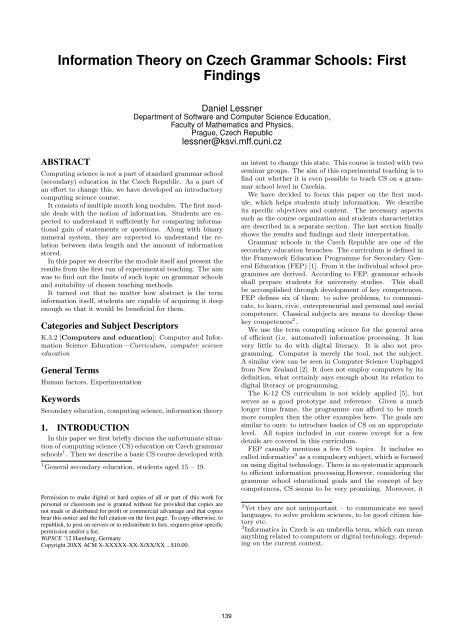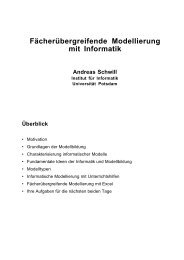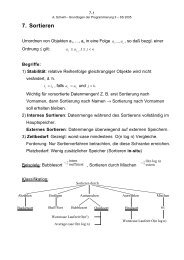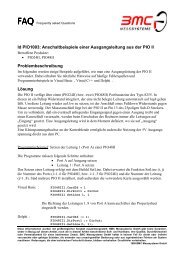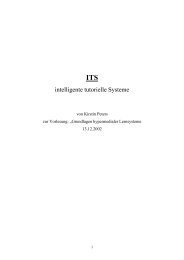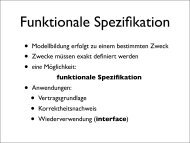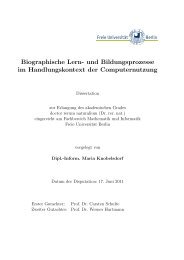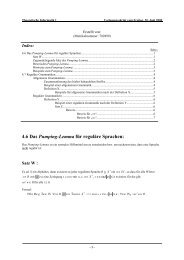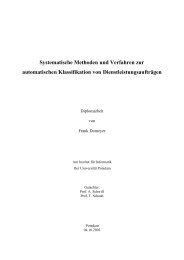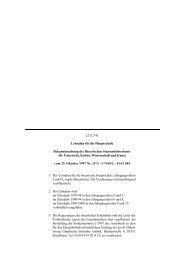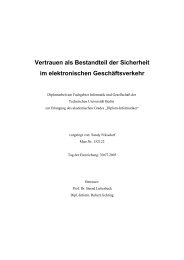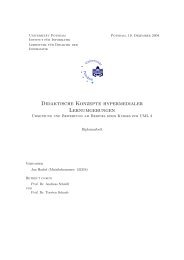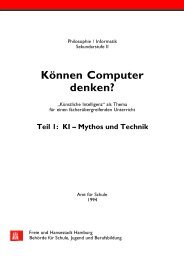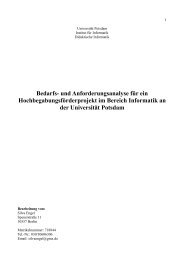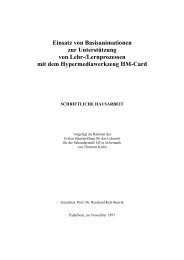Maria Knobelsdorf, University of Dortmund, Germany - Didaktik der ...
Maria Knobelsdorf, University of Dortmund, Germany - Didaktik der ...
Maria Knobelsdorf, University of Dortmund, Germany - Didaktik der ...
You also want an ePaper? Increase the reach of your titles
YUMPU automatically turns print PDFs into web optimized ePapers that Google loves.
Information Theory on Czech Grammar Schools: First<br />
Findings<br />
ABSTRACT<br />
Daniel Lessner<br />
Department <strong>of</strong> S<strong>of</strong>tware and Computer Science Education,<br />
Faculty <strong>of</strong> Mathematics and Physics,<br />
Prague, Czech Republic<br />
lessner@ksvi.mff.cuni.cz<br />
Computing science is not a part <strong>of</strong> standard grammar school<br />
(secondary) education in the Czech Republic. As a part <strong>of</strong><br />
an effort to change this, we have developed an introductory<br />
computing science course.<br />
It consists <strong>of</strong> multiple month long modules. The first module<br />
deals with the notion <strong>of</strong> information. Students are expected<br />
to un<strong>der</strong>stand it sufficiently for comparing informational<br />
gain <strong>of</strong> statements or questions. Along with binary<br />
numeral system, they are expected to un<strong>der</strong>stand the relation<br />
between data length and the amount <strong>of</strong> information<br />
stored.<br />
In this paper we describe the module itself and present the<br />
results from the first run <strong>of</strong> experimental teaching. The aim<br />
was to find out the limits <strong>of</strong> such topic on grammar schools<br />
and suitability <strong>of</strong> chosen teaching methods.<br />
It turned out that no matter how abstract is the term<br />
information itself, students are capable <strong>of</strong> acquiring it deep<br />
enough so that it would be beneficial for them.<br />
Categories and Subject Descriptors<br />
K.3.2 [Computers and education]: Computer and Information<br />
Science Education—Curriculum, computer science<br />
education<br />
General Terms<br />
Human factors, Experimentation<br />
Keywords<br />
Secondary education, computing science, information theory<br />
1. INTRODUCTION<br />
In this paper we first briefly discuss the unfortunate situation<br />
<strong>of</strong> computing science (CS) education on Czech grammar<br />
schools 1 . Then we describe a basic CS course developed with<br />
1 General secondary education, students aged 15 – 19.<br />
Permission to make digital or hard copies <strong>of</strong> all or part <strong>of</strong> this work for<br />
personal or classroom use is granted without fee provided that copies are<br />
not made or distributed for pr<strong>of</strong>it or commercial advantage and that copies<br />
bear this notice and the full citation on the first page. To copy otherwise, to<br />
republish, to post on servers or to redistribute to lists, requires prior specific<br />
permission and/or a fee.<br />
WiPSCE ’12 Hamburg, <strong>Germany</strong><br />
Copyright 20XX ACM X-XXXXX-XX-X/XX/XX ...$10.00.<br />
139<br />
an intent to change this state. This course is tested with two<br />
seminar groups. The aim <strong>of</strong> this experimental teaching is to<br />
find out whether it is even possible to teach CS on a grammar<br />
school level in Czechia.<br />
We have decided to focus this paper on the first module,<br />
which helps students study information. We describe<br />
its specific objectives and content. The necessary aspects<br />
such as the course organization and students characteristics<br />
are described in a separate section. The last section finally<br />
shows the results and findings and their interpretation.<br />
Grammar schools in the Czech Republic are one <strong>of</strong> the<br />
secondary education branches. The curriculum is defined in<br />
the Framework Education Programme for Secondary General<br />
Education (FEP) [1]. From it the individual school programmes<br />
are <strong>der</strong>ived. According to FEP, grammar schools<br />
shall prepare students for university studies. This shall<br />
be accomplished through development <strong>of</strong> key competences.<br />
FEP defines six <strong>of</strong> them: to solve problems, to communicate,<br />
to learn, civic, entrepreneurial and personal and social<br />
competence. Classical subjects are means to develop these<br />
key competences 2 .<br />
We use the term computing science for the general area<br />
<strong>of</strong> efficient (i.e. automated) information processing. It has<br />
very little to do with digital literacy. It is also not programming.<br />
Computer is merely the tool, not the subject.<br />
A similar view can be seen in Computer Science Unplugged<br />
from New Zealand [2]. It does not employ computers by its<br />
definition, what certainly says enough about its relation to<br />
digital literacy or programming.<br />
The K-12 CS curriculum is not widely applied [5], but<br />
serves as a good prototype and reference. Given a much<br />
longer time frame, the programme can afford to be much<br />
more complex then the other examples here. The goals are<br />
similar to ours: to introduce basics <strong>of</strong> CS on an appropriate<br />
level. All topics included in our course except for a few<br />
details are covered in this curriculum.<br />
FEP casually mentions a few CS topics. It includes so<br />
called informatics 3 as a compulsory subject, which is focused<br />
on using digital technology. There is no systematic approach<br />
to efficient information processing.However, consi<strong>der</strong>ing the<br />
grammar school educational goals and the concept <strong>of</strong> key<br />
competences, CS seems to be very promising. Moreover, it<br />
2 Yet they are not unimportant – to communicate we need<br />
languages, to solve problem sciences, to be good citizen history<br />
etc.<br />
3 Informatics in Czech is an umbrella term, which can mean<br />
anything related to computers or digital technology, depending<br />
on the current context.


